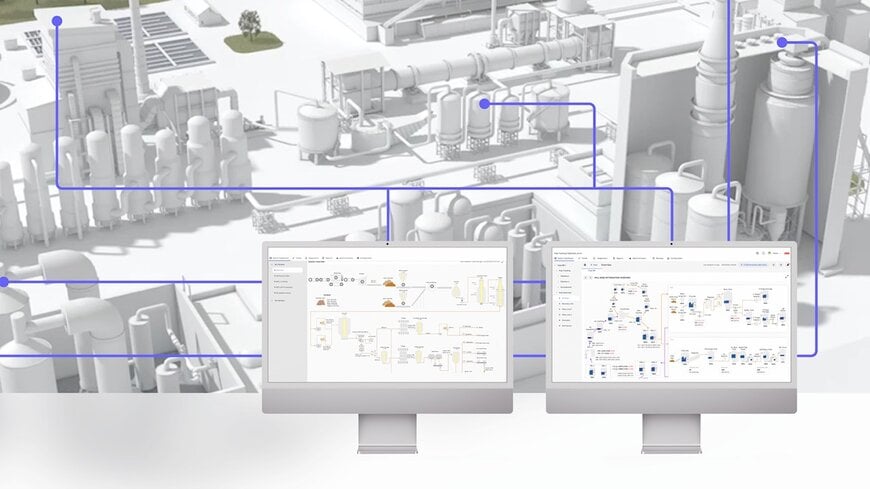www.industryemea.com
01
'25
Written on Modified on
ABB launches software for smarter mill-wide pulp optimization
ABB Ability Plant Optimizer coordinates pulp mill production and operations in real-time, improving quality, efficiency, and profitability by offering end-to-end traceability and dynamic optimization.
global.abb

ABB has introduced ABB Ability™ Plant Optimizer for Pulp Mills, a dynamic software solution that helps pulp producers bridge the gap between production planning and real-time operations. Designed specifically for the complex, interconnected nature of pulp production, the software enables mills to improve traceability, maintain operational stability and reduce production costs throughout the pulp mill.
Running a pulp mill is a constant balancing act. Operators and planners must keep dozens of interconnected processes working in harmony, often while dealing with sudden disruptions, shifting demand and pressure to get more out of the same assets. Yet with systems still managed in silos and many experienced professionals leaving the workforce, it is becoming harder to maintain visibility and act quickly when problems arise. Plant Optimizer for Pulp Mills is designed to change that: giving teams the real-time insight and decision support they need to spot issues earlier, adjust plans faster and focus their time on the tasks that create the most value.
For decades, ABB has partnered with pulp and paper producers to deliver automation, electrification and digital solutions tailored to industry-specific challenges. Building on this experience, ABB has now launched Plant Optimizer for Pulp Mills to help address these challenges through three core capabilities: end-to-end traceability, economic optimization and operational resilience.

With every part of the pulp production process being interlinked, small deviations can have costly ripple effects. Plant Optimizer for Pulp Mills gives operators and engineers the visibility and tools they need to make faster, more confident decisions across the mill. With real-time tracking of material flows and quality-critical variables, it becomes easier to pinpoint process inefficiencies, trace quality deviations to their source, and implement corrective actions before issues escalate. Automated grade transitions, alarm-based diagnostics, and customizable reporting enhance standardization and improve overall operational discipline.
At the same time, the software helps mills move beyond reactive planning by enabling dynamic, forward-looking decision support. It uses higher time-horizon targets from Manufacturing Execution System (MES) to create weekly and daily production plans that account for real-world constraints. By modeling alternative scenarios for demand changes, shutdown and startup planning or resolving bottlenecks, it provides recommendations that balance throughput, cost and resource use. It calculates optimal set-points and production rates – either on demand or continuously – allowing teams to minimize waste, increase throughput and reduce cost-to-produce, all within the existing asset base. The result is a more agile and resilient mill, capable of adapting to change without sacrificing quality or efficiency.
www.global.abb
Running a pulp mill is a constant balancing act. Operators and planners must keep dozens of interconnected processes working in harmony, often while dealing with sudden disruptions, shifting demand and pressure to get more out of the same assets. Yet with systems still managed in silos and many experienced professionals leaving the workforce, it is becoming harder to maintain visibility and act quickly when problems arise. Plant Optimizer for Pulp Mills is designed to change that: giving teams the real-time insight and decision support they need to spot issues earlier, adjust plans faster and focus their time on the tasks that create the most value.
For decades, ABB has partnered with pulp and paper producers to deliver automation, electrification and digital solutions tailored to industry-specific challenges. Building on this experience, ABB has now launched Plant Optimizer for Pulp Mills to help address these challenges through three core capabilities: end-to-end traceability, economic optimization and operational resilience.

With every part of the pulp production process being interlinked, small deviations can have costly ripple effects. Plant Optimizer for Pulp Mills gives operators and engineers the visibility and tools they need to make faster, more confident decisions across the mill. With real-time tracking of material flows and quality-critical variables, it becomes easier to pinpoint process inefficiencies, trace quality deviations to their source, and implement corrective actions before issues escalate. Automated grade transitions, alarm-based diagnostics, and customizable reporting enhance standardization and improve overall operational discipline.
At the same time, the software helps mills move beyond reactive planning by enabling dynamic, forward-looking decision support. It uses higher time-horizon targets from Manufacturing Execution System (MES) to create weekly and daily production plans that account for real-world constraints. By modeling alternative scenarios for demand changes, shutdown and startup planning or resolving bottlenecks, it provides recommendations that balance throughput, cost and resource use. It calculates optimal set-points and production rates – either on demand or continuously – allowing teams to minimize waste, increase throughput and reduce cost-to-produce, all within the existing asset base. The result is a more agile and resilient mill, capable of adapting to change without sacrificing quality or efficiency.
www.global.abb

